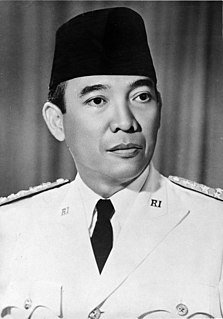
Sukarno was an Indonesian statesman, politician, nationalist, and assimilationist who was the first president of Indonesia, serving from 1945 to 1967.

The Greater East Asia Co-Prosperity Sphere, or the GEACPS, was an imperialist concept which was developed in the Empire of Japan and propagated to Asian populations which were occupied by it from 1931 to 1945. It extended across the Asia-Pacific and promoted the cultural and economic unity of East Asians, Southeast Asians, South Asians and Oceanians. It also declared the intention to create a self-sufficient bloc of Asian nations which would be led by the Japanese and be free from the rule of Western powers. The idea was first announced on 1 August 1940 in a radio address delivered by Foreign Minister Yōsuke Matsuoka.
South East Asia Command (SEAC) was the body set up to be in overall charge of Allied operations in the South-East Asian Theatre during World War II.

Pramoedya Ananta Toer was an Indonesian author of novels, short stories, essays, polemics and histories of his homeland and its people. His works span the colonial period under Dutch rule, Indonesia's struggle for independence, its occupation by Japan during the Second World War, as well as the post-colonial authoritarian regimes of Sukarno and Suharto, and are infused with personal and national history.

South Maluku, also South Moluccas, officially the Republic of South Maluku, is an unrecognized secessionist republic that claims the islands of Ambon, Buru, and Seram, which make up the Indonesian province of Maluku.
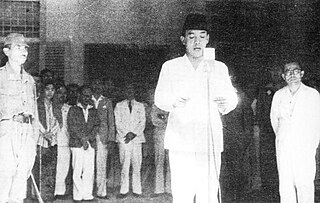
The Proclamation of Indonesian Independence was read at 10:00 am on Friday, 17 August 1945. The declaration marked the start of the diplomatic and armed resistance of the Indonesian National Revolution, fighting against the forces of the Netherlands and pro-Dutch civilians, until the latter officially acknowledged Indonesia's independence in 1949. The document was signed by Sukarno and Mohammad Hatta, who were appointed president and vice-president respectively the following day.

UTC+09:00 is an identifier for a time offset from UTC of +09:00.
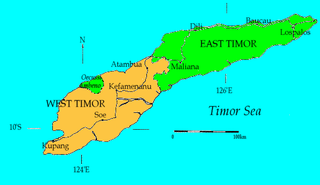
Great Timor refers to the irredentist concept of a united and independent island of Timor, which is currently divided between the independent state of East Timor and the Indonesian territory of West Timor. The concept of unifying the island has been raised since the mid-20th century.

The Investigating Committee for Preparatory Work for Independence, sometimes referred to as the Investigating Committee for Preparatory Work for Indonesian Independence, was an organization set up in March 1945 by the Japanese military authority in Java during the Japanese occupation of the Dutch East Indies as the initial stage of the establishment of independence for the area under the control of the Japanese 16th Army. The BPUPK held two plenary meetings; the first was from 28 May to 1 June 1945 and the second was between 10 and 17 July 1945.

The Japanese Empire occupied the Dutch East Indies during World War II from March 1942 until after the end of the war in September 1945. In Indonesian history, the period was one of the most critical.

Greater Indonesia was a political concept that sought to bring the so-called Malay race together by uniting the territories of Dutch East Indies with the British Malaya and British Borneo. It was espoused by students and graduates of Sultan Idris Training College for Malay Teachers in the late 1920s, and individuals from Sumatra and Java including Mohammad Yamin and Sukarno in the 1950s. Indonesia Raya was adapted as the name of what latter became the Indonesian national anthem in 1924.

The Indonesian National Awakening is a term for the period in the first half of the 20th century, during which people from many parts of the archipelago of Indonesia first began to develop a national consciousness as "Indonesians".

Sutomo, also known as Bung Tomo, is best known for his role as an Indonesian military leader during the Indonesian National Revolution against the Netherlands. He played a central role in Battle of Surabaya when the British attacked the city in October and November 1945.

Kesatuan Melayu Muda (KMM) was the first leftist and national political establishment in British Malaya. Founded by Ibrahim Yaacob and Ishak Haji Muhammad, KMM grew into a prominent pre-war nationalist movement, notable for its leftist political stance and willingness to use violence, a sharp break with their contemporaries in the Malay nationalist movement.

This is a survey of the postage stamps and postal history of Indonesia.
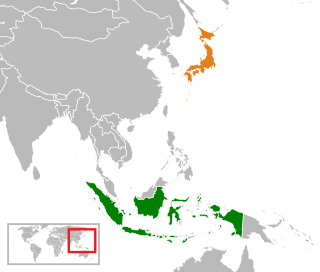
Indonesia and Japan established diplomatic relations in 1958. Both are two Asian nations that share historical, economic, and political ties. Both nations went through a difficult period in World War II when the then Dutch East Indies was occupied by the Imperial Japanese Army for three-and-a-half years. Japan is a major trading partner for Indonesia. Japan is Indonesia's largest export partner and also a major donor of development aid to Indonesia through Japan International Cooperation Agency. Indonesia is a vital supplier of natural resources such as liquefied natural gas to Japan. Both countries are members of the G20 and APEC. Today in Indonesia, there are about 11,000 Japanese expatriates whereas in Japan, there are approximately 24,000 Indonesian nationals working and training.
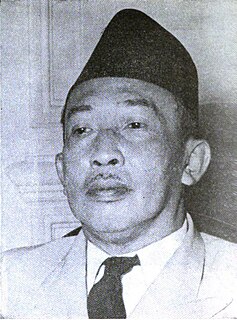
Iwa Koesoemasoemantri was an Indonesian politician. Born in Ciamis, West Java, Iwa graduated from legal school in the Dutch East Indies and Netherlands before spending time at a school in the Soviet Union. After returning to Indonesia he established himself as a lawyer, nationalist, and, later, a figure for workers' rights. During the first twenty years of Indonesia's independence Iwa held several cabinet positions. After retiring he continued to write. In 2002 Iwa was declared a National Hero of Indonesia.

Arnoldus Isaac Zacharias Mononutu was a nationalist involved in the struggle for Indonesian independence. Mononutu gained his sense of Indonesian nationalism during his post-secondary studies in the Netherlands. In the early years of the Indonesian government, he served as Information Minister and was the first Ambassador of Indonesia to China. He later became Rector of Hasanuddin University. Mononutu was posthumously given the honorary title of National Hero of Indonesia in 2020.
Shigetada Nishijima (西嶋重忠) was a Japanese scholar, former spy and lobbyist. He was active in Indonesia before, during and after the Japanese occupation of Indonesia, and became a major figure on the Japanese side of the Indonesian National Revolution. Between the 1950s and the 1960s, he was a lobbyist and an intermediary, linking Japanese and Indonesian interests. Later on, he became a scholar of and published memoirs of his time in Indonesia.
The Dayak Desa War or Majang Desa War was an armed uprising by the Dayak Desa tribe, and later Indonesian nationalists, in West Kalimantan against the Japanese Empire and the Dutch East Indies during World War II. The war was initially caused by the local population's opposition against the rōmusha system and disappointment with Japanese occupation. In the initial phase of Japanese occupation, several Japanese companies entered the region to gain natural resources in order to support the Japanese war effort in the Pacific. Occupying Japanese forced locals to work for free for these companies, mainly in coal mining and timber production. After that, a Japanese foreman working in a company wanted to marry the daughter of Pang Linggan, a respected Dayak chief in the region, which caused more tension between locals and the Japanese. Dayak tribes in the region initiated mangkuk merah ritual, as a sign to mobilise men from villages and prepare for war. The Japanese were driven out of the Borneo interior in June 1945, but returned on 17 July and continued until 31 August 1945 when Japanese forces there surrendered and left the region, replaced by Allied forces including the Dutch, who would later be opposed again until recognition of Indonesian independence in 1949.















